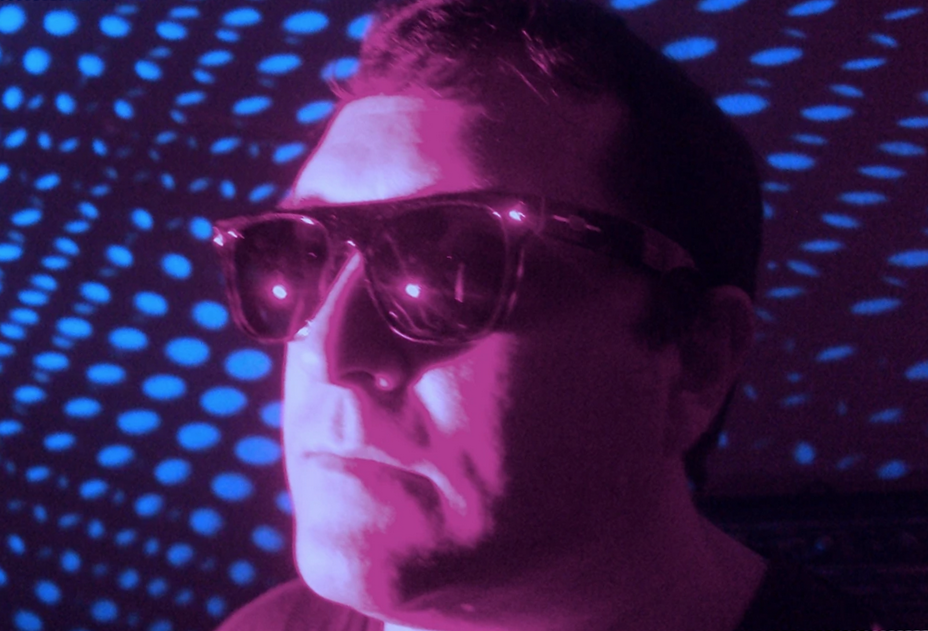The Grid and Beyond The Wizards Sleeve’s Richard Norris explains how forests, psychedelia and John Waters films inspired his mind-expanding visions

Track And Field
“Our family grew up in a small rented cottage on a Girl Guide campsite just outside St Albans. It was on the outskirts of a tiny village about a mile down a track from any civilisation. The campsite was used by the Guides for a few weeks in the summer, but otherwise I had nine acres of woods to myself.
“The forest drew me in. It felt like it was protecting me and that it somehow knew I was there. At that age it seemed enormous, and it felt like I was in it for an endless amount of time, so I’m sure there must be something connected to getting into field recording and using contact mics. I’ve amassed a collection of coil mics, hydrophones, bat detectors and various surround sound mics like Sennheiser’s ambisonic mics. I use them all over the place now; metal in the street: railings or park benches, you name it. It’s my favourite kind of noise.
“I did an entire track with the railings on the way to the swimming pool while on holiday in Crete called ‘End Of The Season’. It was still this blazing weather, but absolutely no one was around in this enormous complex where there are usually thousands of people, because it was October. It was quite eerie, and I went around taking William Eggleston-esque pictures and recording lots of amazing metal rails around the swimming pool using contact mics.”
Portobello Road
“I moved into London just as acid house was breaking, around 1988. It was at the scuzzier end of Portobello, though it’s tarted itself up a bit now. Within spitting distance was my record label, the studio where we recorded all The Grid records, the graphic designer, the PR guy, the publisher and Virgin Records as well. You could pretty much do all your business within half an hour and then knock off to the pub.
“These days it has this theatrical feel, a kind of San Francisco years after it was at the epicentre vibe about it. You don’t see hipster beards. There may be a couple of artisan shops, but not many. Hipsters would turn their noses up at west London, because they think it’s all trustafarians and rich people, but that does mean you can just get on with your thing.
“We moved back recently and it’s still quite spiky. There’s a regular who smokes crack in the phone box outside my window. But I also like seeing Jarvis Cocker ride by on his push bike or Black Midi stroking my dog in the pub. There’s still an air of bohemia, which is alright, and I get to see Brian Eno outside my house as I’m working away in my studio making long, looming notes. It does give me comfort that Eno’s around the corner.”
Still Waters
“One of the first things Dave Ball and I bonded over was the filmography of John Waters. These gleefully amoral, low rent B movies were a big part of my youth. Me and my mate John would go out in London from where we lived in St Albans and we always missed the train back from Kings Cross. The first morning milk train didn’t leave until about 5am, so we spent a lot of time in the Wimpy Bar and other places around the area, which was pretty sleazy at the time. And then we discovered all-night films at the Scala Cinema…
“Soon we were going there regularly, watching exploitation films, art films, midnight movie classics, psychedelic reels like ‘The Trip’, ‘Riot On Sunset Strip’ and ‘Psych-Out’, and then there were the films of John Waters: ‘Pink Flamingos’, ‘Desperate Living’, ‘Female Trouble’… they were hip, funny, trashy and outrageous, an eye-opening 60s and early 70s Baltimore that we couldn’t have imagined. When Waters used the Grid’s ‘Swamp Thing’ in the party scene finale of his film ‘Pecker’, Dave and I thought it was our finest achievement.
“It’s a shame he hasn’t made any films for ages – he can’t get them funded. I just love the sheer effrontery and the glee with which they were done. I suppose those types of films are of their time.”
Garage Days Revisited
“Psychedelia has been an ongoing influence since my teens when I worked for the reissue label, Bam Caruso, a great first job just out of university. We released around 20 compilations of obscure British songs that were these insane three-and-a-half minute freakouts from bands you’d never hear of again. After Decca signed The Stones, there were all these bands with one-single deals who just got the one shot.
“I love everything, from obscure garage to the well-known classics; the many local variations worldwide to the weird, easy listening tracks with flower power influences. It’s music with a particular atmosphere that plays with time and space, and it’s always an influence in whatever music I’m currently making.
“I co-produced the ‘Jack The Tab’ album with Genesis P-Orridge who introduced me to a lot of the John Cage ideas; the city as an orchestra and the idea that there isn’t really silence. We weren’t constricted by style or copyright or genre, because acid house didn’t really exist then. We weren’t making an acid house record, we were making what we thought a psychedelic dance record would sound like with electronics and samplers. When we actually heard some, we were like, ‘Oh, that wasn’t what was in our minds’. We were much more interested in the acid part.”
Alan Moore
“The wisdom of Alan Moore has been a constant for me for decades. We’re very lucky to have him, and when the dust has settled I think people will realise what an important figure he was.
“My favourite comic book series of his is ‘Promethea’, a great work with a lot of depth that demonstrates a deep insight into Alan’s understanding of magic. While it starts off as a fairly straight superhero story, he manages to put in all this esoteric knowledge of things like the tarots. He’s written it in verse as well – he’s definitely a master of that stuff. We have many of the same references.
“I’ve just been up to Nottingham to record a two-hour special with Alan for the BBC, which will air on 6 Music later this year. There are lots of references to music in his work that not many people have asked him about really. I find him a very interesting person to talk to; if you look into his eyes, it’s like a thousand yard stare, but going inwards.”





